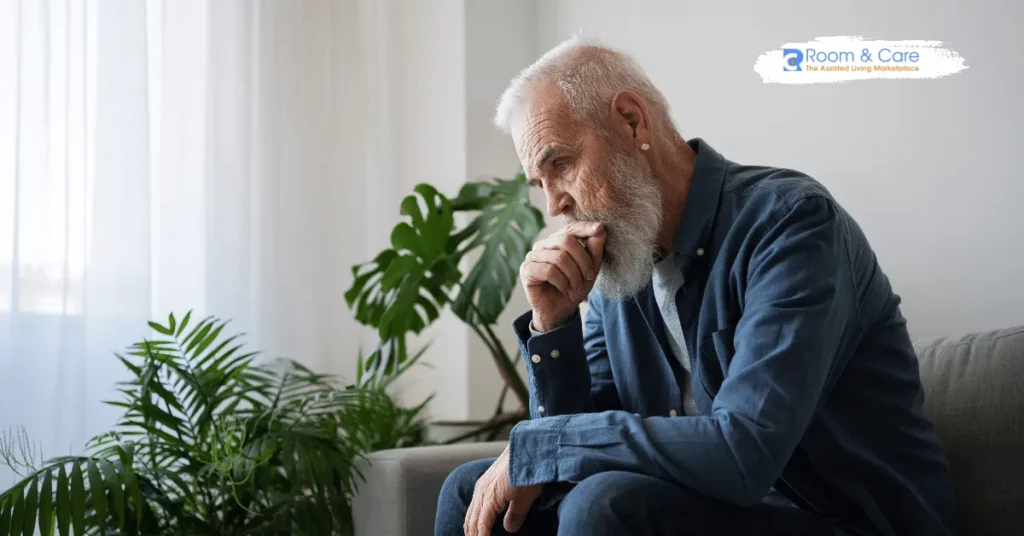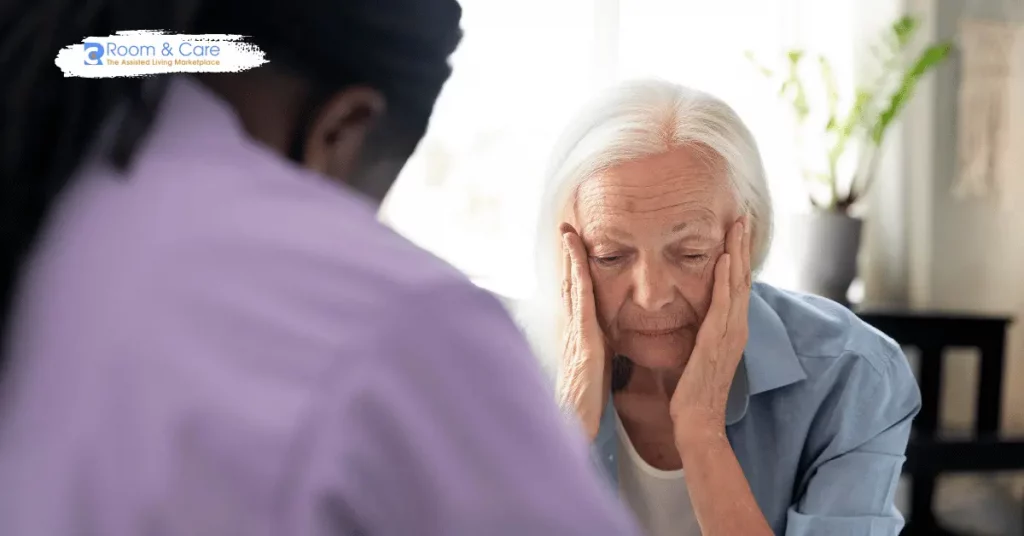

Depression is a serious and often overlooked condition among older adults. Understanding the signs of depression in seniors is crucial in ensuring the mental and emotional well-being of our aging loved ones. Whether they are living independently, in assisted living facilities, adult family homes, or nursing homes, recognizing the early signs of depression can lead to timely interventions that significantly improve their quality of life. In this guide, we will explore the most common symptoms of depression in seniors, the impact it has on their overall health, and the role that senior living communities can play in supporting those who struggle with this condition.
Depression in seniors is a widespread issue, yet it often goes undiagnosed due to misconceptions about aging and mental health. Many people assume that feelings of sadness, low energy, or withdrawal from activities are simply part of growing older, but this is not the case. Depression in seniors is a medical condition that requires attention and treatment, just as it does in younger populations. With the growing number of elderly individuals in the U.S. and globally, understanding how to recognize and address depression in older adults is more important than ever.
Depression is not an inevitable part of aging. However, many seniors experience it due to life changes such as the loss of a spouse, retirement, or the onset of chronic health conditions. Unlike younger adults who might openly express feelings of sadness or hopelessness, seniors often manifest depression in more subtle ways. Physical complaints, such as aches and pains, sleep disturbances, and fatigue, may mask the emotional struggles they are facing.
This makes it all the more important for caregivers, family members, and professionals in independent living communities, assisted living facilities, and adult family homes to stay vigilant about the mental health of the elderly. Depression not only diminishes the quality of life but also worsens physical health and increases the risk of other illnesses.
Physical health symptoms overshadow mental health concerns: Seniors are more likely to report physical complaints rather than emotional ones. As a result, their depression may be mistakenly attributed to other medical conditions.
Isolation: Many seniors live alone or are less socially active as they age. Without regular social interaction, the signs of depression may go unnoticed by family members and caregivers.
Stigma: Some seniors may be reluctant to acknowledge feelings of depression because of the stigma surrounding mental health, particularly in older generations.
Understanding these barriers to diagnosis is the first step in identifying depression in seniors. By recognizing the less obvious signs and remaining proactive, caregivers can help seniors receive the mental health care they need.
Depression in seniors can present in a variety of ways, often differently than it does in younger adults. Here are some of the key signs of depression in seniors that you should watch for:
One of the most telling signs of depression in seniors is a loss of interest or pleasure in activities they once enjoyed. This might include a reluctance to engage in hobbies, attend social events, or participate in family gatherings. Seniors living in independent living communities or assisted living facilities may begin to withdraw from group activities or spend more time alone in their rooms. This shift in behavior is often one of the first indicators that something is wrong.
Depression can cause significant disruptions to sleep. Some seniors may experience insomnia, finding it difficult to fall asleep or stay asleep. Others may sleep excessively, using sleep as a way to escape feelings of sadness or hopelessness. In senior living communities, caregivers should be on the lookout for residents who either appear fatigued throughout the day or are frequently sleeping during odd hours.
Another sign of depression in seniors is a noticeable change in appetite. Some individuals may lose interest in food and experience significant weight loss, while others might overeat as a way to cope with their emotions. If a senior is not eating as much as usual or seems to be gaining or losing weight rapidly, this could be a red flag for depression.
Depression often leads to withdrawal from social interactions, which is particularly concerning for seniors living in communal environments like adult family homes or assisted living facilities. If a senior is avoiding friends, family, or social activities that they once enjoyed, it could be a sign that they are struggling emotionally.
Feelings of sadness, hopelessness, or anxiety that persist for more than a few weeks are strong indicators of depression. Some seniors may express these feelings openly, while others may appear more irritable or anxious without explaining why. Family members and caregivers should pay attention to sudden mood changes or ongoing emotional distress in their loved ones.
Many seniors with depression experience chronic fatigue and a lack of energy, even after a full night’s sleep. They may struggle to complete daily tasks, such as personal hygiene or household chores, and show little interest in physical activities. This can be particularly concerning in assisted living facilities or independent living communities, where maintaining a level of independence is important for overall well-being.
Depression can impair cognitive function, making it difficult for seniors to concentrate or remember things. In some cases, these cognitive symptoms may be mistaken for early signs of dementia, but they could also be linked to depression. Caregivers in senior living communities should be mindful of residents who suddenly seem confused or have trouble focusing.
Physical symptoms without a clear medical cause are common in seniors with depression. Complaints of headaches, digestive problems, or general aches and pains that do not have an obvious explanation can be a sign that a senior is struggling with emotional distress. In some cases, these physical complaints may be the only outward sign of depression.
Expressions of hopelessness, guilt, or worthlessness are serious red flags for depression in seniors. These feelings can lead to more severe outcomes, including thoughts of suicide. If a senior talks about feeling like a burden, or if they express that life is no longer worth living, it is crucial to seek immediate professional help.

Senior living communities such as independent living, assisted living facilities, and adult family homes provide a supportive environment for older adults, but they are not immune to the challenges of depression. In fact, these communities can play a pivotal role in identifying and managing depression in their residents.
One of the major benefits of senior living communities is the opportunity for social interaction. Regular socialization has been shown to improve mood and reduce feelings of loneliness, which can be a major contributor to depression in seniors. In independent living communities and assisted living facilities, there are often planned activities and events designed to encourage residents to engage with one another. For seniors living at home or in adult family homes, caregivers should prioritize regular visits and opportunities for social interaction to help combat feelings of isolation.
Many senior living communities offer access to mental health professionals, such as counselors or therapists, who can help residents manage their depression. Assisted living facilities and adult family homes often have trained staff who can recognize the signs of depression and recommend appropriate treatment options, including therapy, medication, or lifestyle changes. For families, it’s important to ask about the availability of mental health services when choosing a senior living community for a loved one.
Maintaining physical health is key to improving mental well-being. Assisted living facilities and adult family homes often offer fitness programs, healthy meal options, and wellness checks to ensure residents stay active and engaged. Exercise, even in small amounts, can help alleviate symptoms of depression by releasing endorphins and improving mood.
Senior living communities provide structured daily routines, which can be beneficial for those with depression. Having a routine helps seniors feel a sense of purpose and accomplishment, even if it’s something as simple as attending a communal meal or participating in a light exercise class. This structure can be especially helpful for seniors who are struggling with motivation or feelings of hopelessness.
If you suspect that your loved one is struggling with depression, there are several steps you can take to support them:
Approaching the subject of mental health with seniors can be challenging, especially if they come from a generation that is less comfortable discussing emotions. Start by expressing your concern in a caring, non-judgmental way. Let them know that you are there to support them and that it’s okay to ask for help.
Depression is treatable, and there is no need for seniors to suffer in silence. Encourage your loved one to see a doctor or mental health professional who can provide guidance on the best course of treatment, which may include therapy, medication, or both.
Help your loved one stay socially connected, whether through regular visits, phone calls, or involvement in group activities within their senior living community. Social interaction can help lift their spirits and reduce feelings of loneliness or isolation.
Exercise is a powerful tool in combating depression. Encourage your loved one to engage in physical activities that they enjoy, whether it’s taking a daily walk, joining a fitness class, or participating in gentle yoga. Many assisted living facilities and independent living communities offer exercise programs tailored to the needs of seniors.
Keep an eye on any changes in your loved one’s physical or mental health. Be proactive about scheduling regular check-ups and ensuring that they are following any treatment plans prescribed by their doctor.
If your loved one’s current living situation isn’t meeting their needs, it may be time to consider other options such as assisted living, adult family homes, or even memory care facilities. Each type of senior living community offers different levels of support, and finding the right environment can make a significant difference in their overall well-being.
At Room and Care, we make it easy to find the right senior living option for your loved one. We offer a wide range of choices, including assisted living facilities, adult family homes, memory care communities, and nursing homes. And with no referral fees or middlemen, you can be sure that you are getting direct access to the best care at an affordable cost.
Depression in seniors can be caused by a variety of factors, including chronic health conditions, the loss of a loved one, social isolation, or major life changes like retirement. In some cases, depression may be triggered by medications or other medical treatments.
It’s common for seniors to resist treatment for depression, especially if they are uncomfortable discussing mental health. Be patient and supportive, and continue to encourage them to seek help. Sometimes, involving a trusted doctor or family member in the conversation can make a difference.
Yes, senior living communities such as independent living, assisted living facilities, and adult family homes offer a supportive environment where caregivers can monitor residents for signs of depression and provide access to mental health resources. Social activities, regular exercise, and structured routines can also help improve mood and reduce the risk of depression.

Recognizing the signs of depression in seniors is an essential part of caring for your aging loved ones. Depression is a serious condition that can have a profound impact on both mental and physical health, but with the right support, treatment, and living environment, seniors can overcome these challenges and lead fulfilling, happy lives.
If you’re looking for the best senior living community for your loved one, whether it’s an assisted living facility, adult family home, or independent living community, Room and Care is here to help. With no referral fees and a direct, transparent approach, we can connect you to the right care options to ensure your loved one’s well-being. Reach out today to learn more about how we can assist you in finding the perfect place for your family member’s needs.
By taking action now, you can help your loved ones enjoy their golden years with the care and support they deserve.